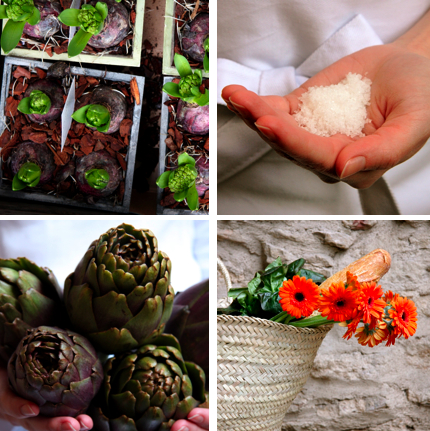
primary-image, l
(post, Marjorie Taylor)

primary-image, l
p(blue). Editor's note: This post is by Marjorie Taylor, the proprietor of The Cook’s Atelier. She cooks and writes about food from her tiny home in Burgundy, France. See more of her writing on her blog, The Cook's Atelier. When was the last time you shook hands with your local farmer or asked about how the chickens were raised when you picked up a dozen eggs at your local farmers' market? These simple questions offer a glimpse of what it means to eat sustainably. It’s not difficult; it just takes some planning and the desire to be more connected to the food you eat and to educate yourself on the way our food is produced from field to table. Eating sustainably really is about being conscious of what you are eating and how that affects the health of your family, your community and the planet. As a cook, I have been a long-time supporter of shopping at my local farmers’ markets, cooking with the seasons, and the philosophy behind the growing sustainable movement. However, I am surprised at the number of students in my cooking classes who are not aware of how to practice this in their everyday lives. Here are some simple ways that you can eat well and at the same time be part of something good. Put value back in food One of the most difficult things to do when one tries to eat sustainably is to rethink what you’ve learned about the price of food. With the current economic times, we may have tried to trim our household budget, and the first item that usually gets slashed is the money that we spend on groceries. Fifty years ago the average American spent 20% of their monthly budget on food. Today, that’s down to 10%. Now, more than ever, is the perfect time to get reconnected with the food you put on your table. Highly processed food is expensive, and it’s bad for your health and the health of the environment. Buy local, buy organic By now, we have all heard that the produce grown in the United States travels an average of 1,500 miles before it shows up at our neighborhood grocery store. A simple way to begin living a sustainable lifestyle is to get to know the farmers at your local market or join a community supported agriculture (CSA) group. Buying organic ensures that you are not consuming harmful pesticides and that you are supporting farmers who work their land sustainably. Not only will you be able to purchase the freshest food possible, but you’ll also be doing something good for your community by supporting local farmers. Cook with the seasons The typical American doesn’t bat an eye when shopping in the grocery store at the sight of tomatoes in February or an assortment of berries in the middle of winter. We seem to be disconnected from the seasons. Your cooking will greatly improve just by shopping with the seasons and choosing the best quality ingredients. Start a kitchen garden Even if you live in the city, you can get a little closer to the food you eat by starting a kitchen garden. If space is tight, try growing your favorite herbs in a container or even an assortment of your favorite salad greens in a pot on the terrace or in a window box. Eat real food, avoid packaging Eat real foods like grass-fed beef, cold-pressed olive oil, real butter, whole milk and artisan cheese. Over-processed food requires more packaging. I avoid industrialized food like the plague, and don’t even get me started on the industrial production of beef, pork, chicken and eggs. I purchase these items from farmers that I know, who have a love of what they do, and respect for their animals and the planet. Another thing - it’s better to purchase a whole chicken, rather than just pieces. By doing this you ensure the freshness of the bird, avoid excess packaging, and you can stretch your grocery dollar too. When you purchase an entire bird, you can create several meals and use the leftovers to make a pot of chicken stock. Eat less meat, quality over quantity It is said that grain-fed, pen-raised animals consume half of the antibiotics used in America and that industrially-raised livestock produce more greenhouse gases than the transportation sector. Choose beef, pork and poultry that have been sustainably raised, and make it twice a week rather than every day. You’ll be doing your health a favor as well as the health of the planet. Invest in a market bag The question you often hear as you are checking out of your local market is, paper or plastic? The option is clear - neither. Pick up a colorful market bag to tote your groceries home. It’s a simple way to make a difference. Bring the family back to the table It is said that the replacement of the American family dinner with processed, quick meals on the run is linked to a variety of social problems, including depression and the increased rate of obesity in young people. Bring your family back to the table and get reconnected.

featurette-image, l